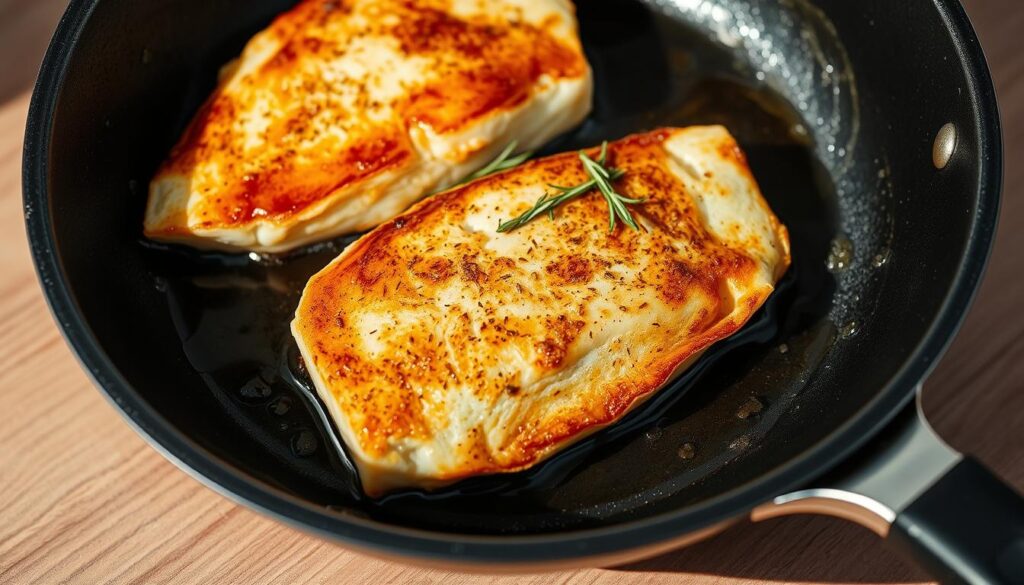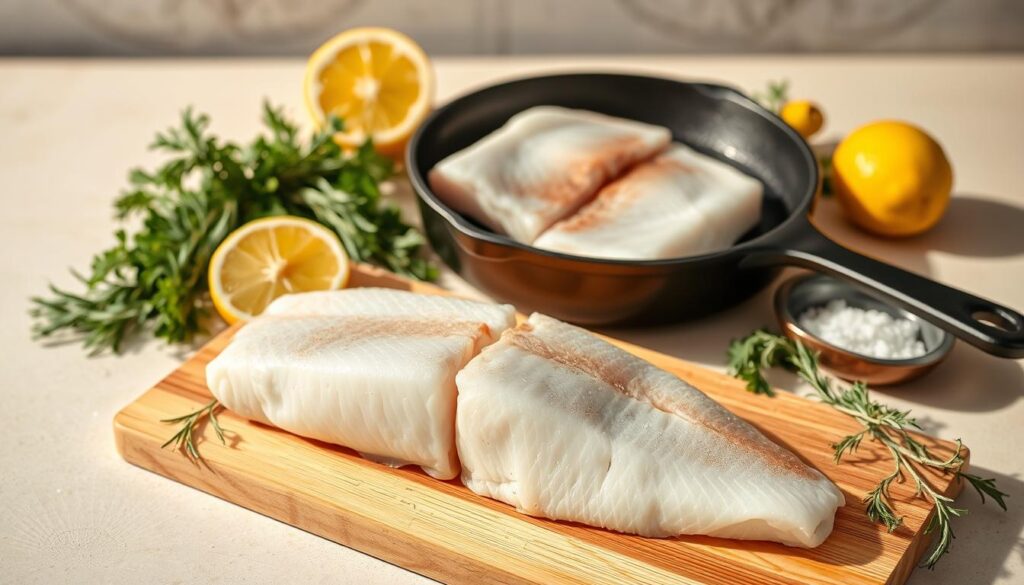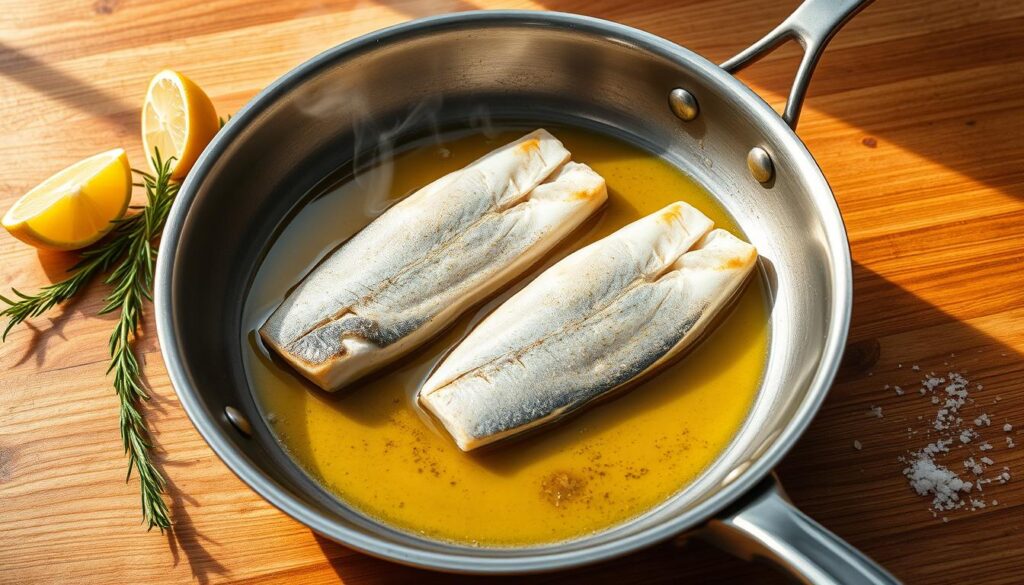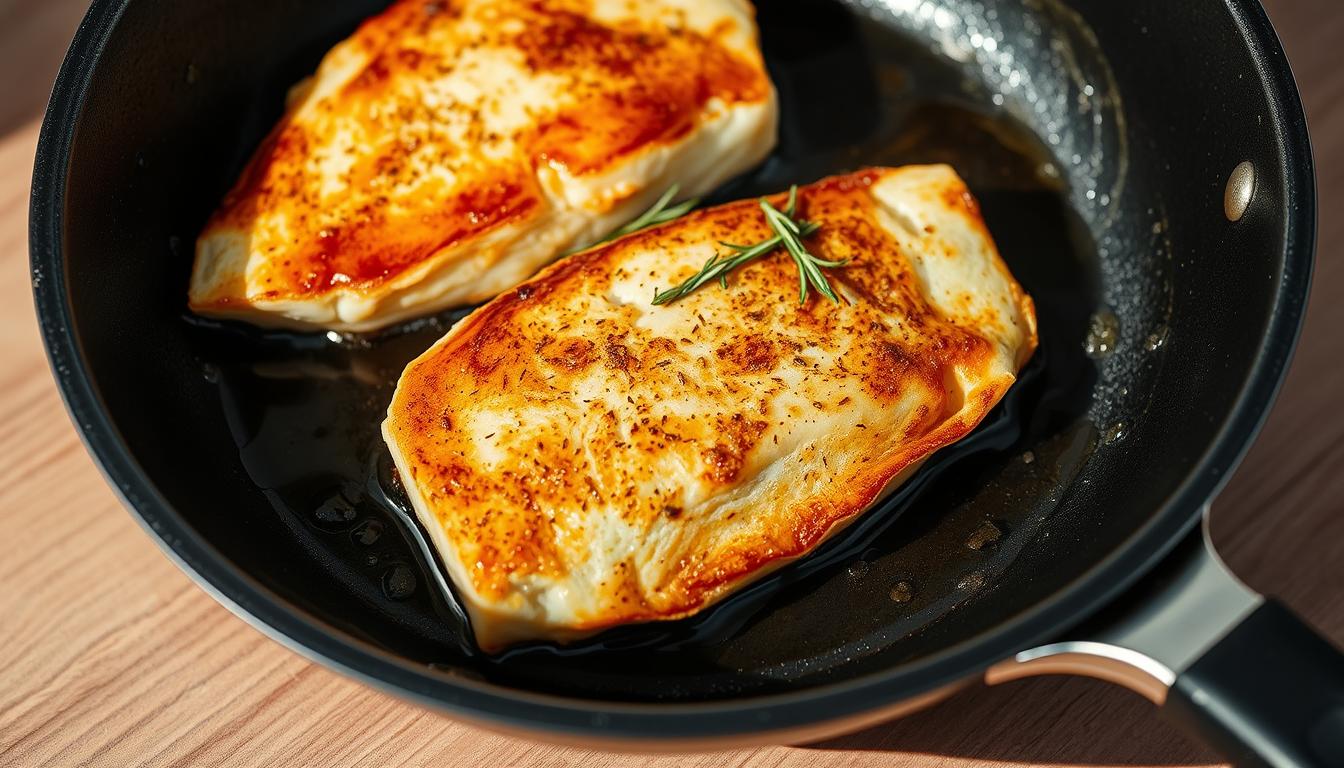
Turning a simple swordfish steak recipe into a restaurant-quality meal is magical. As a passionate home cook, I’ve learned to make perfect pan-fried swordfish. Every bite is a delight.
Pan cooking swordfish is more than just throwing fish in a skillet. It’s about mastering technique, flavor, and heat balance. This guide will teach you to make delicious swordfish steaks, perfect for seafood lovers or cooking enthusiasts.
Your cooking journey begins here, with techniques to make swordfish extraordinary. Impress your family and friends with meals that are unforgettable. You’ll master professional cooking skills.
Key Takeaways
- Master the art of pan-frying swordfish with professional techniques
- Learn critical temperature control for perfect swordfish steaks
- Discover flavor combinations that enhance swordfish’s natural taste
- Understand the importance of selecting high-quality swordfish
- Gain confidence in creating restaurant-quality seafood dishes at home
Table of Contents
Essential Ingredients for Pan Fried Swordfish
Creating tasty swordfish recipes begins with the right ingredients. Your swordfish steak recipe will stand out with the right choices. Quality ingredients make a simple meal into a work of art.

Quality Swordfish Selection Tips
When choosing swordfish steaks, look for these key traits:
- Bright, translucent white or light pink color
- Firm texture without bruising
- Fresh ocean smell
- Recommended thickness of 1 inch for optimal cooking
Required Seasonings and Herbs
Boost your swordfish steak recipe with these classic seasonings:
| Seasoning | Quantity | Purpose |
|---|---|---|
| Sea Salt | 1 tsp | Enhances natural flavor |
| Black Pepper | 1/2 tsp | Adds mild heat |
| Herbs de Provence | 1 tbsp | Provides aromatic complexity |
Cooking Oils and Butter Options
Choose your cooking fat wisely for the best flavor:
- Olive Oil: Classic Mediterranean choice
- Ghee: High smoke point, rich flavor
- Coconut Oil: Unique tropical undertone
- Recommended amount: 2 tablespoons
Pro tip: Always pat your swordfish steaks dry before seasoning to ensure perfect searing.
Preparing Your Swordfish Steaks for Cooking

Getting your swordfish steaks ready for pan cooking is key. The first step is to prepare them well. You want to make sure the fish is seasoned and textured right.
Start by picking swordfish steaks that are about 1 inch thick. This makes sure they cook evenly and stay tender. Before you cook, follow these important steps:
- Pat the swordfish steaks dry with paper towels
- Remove any extra moisture for a crispy outside
- Check the fish for any bones
- Look at the color and texture for freshness
Seasoning is vital for great swordfish recipes. Sprinkle both sides with kosher salt and freshly ground black pepper. You can also add herbs or a bit of olive oil for extra flavor.
Let the seasoned swordfish sit at room temperature for 5-8 minutes before cooking. This helps it cook evenly and get a nice golden crust. Aim for 6-8 ounces per person for the best taste and size.
Pro Tip: Always buy fresh swordfish from a reputable fishmonger to guarantee the best taste and texture for your pan-seared recipes.
Basic Pan Frying Techniques for Swordfish
Learning to pan fry swordfish is key to making great dishes. The right methods can turn your swordfish into a standout meal. It ensures your food tastes amazing every time.
When cooking swordfish, picking the right pan and controlling the heat are essential. You want to get a golden-brown crust and keep the fish tender inside.
Temperature Control Guidelines
Getting the swordfish just right depends on managing the heat well. Here are some temperature tips:
- Use medium-high heat (around 400°F)
- Aim for internal temperature of 130-140°F
- Cook approximately 3.5 minutes per side
Choosing the Right Pan
The pan you choose greatly affects your swordfish’s cooking. Cast iron or heavy stainless steel skillets are best. They distribute heat evenly.
Expert Flipping Techniques
Flipping the swordfish right is important. It helps cook it evenly and keeps it from breaking. Use a thin, strong spatula and flip only once.
Pro tip: Look for a golden-brown crust as your signal to flip the swordfish.
Swordfish steaks are usually 1 to 1.5 inches thick. Adjust your cooking time to get it just right.
Classic Herb-Butter Pan Fried Swordfish
Take your swordfish recipes to the next level with a classic herb-butter method. It turns a simple swordfish steak into a gourmet dish. The secret is in the rich, aromatic butter blend that pairs perfectly with swordfish’s meaty texture.
To make your herb-butter swordfish, you’ll need a few ingredients:
- Fresh unsalted butter
- Fresh herbs like thyme, parsley, and basil
- Minced garlic
- Sea salt and black pepper
Creating the herb butter is key. Soften the butter at room temperature. Then, finely chop your herbs. Mix them well into the butter, making a vibrant green spread. This spread will give your swordfish amazing flavor.
Here’s how to cook your swordfish steak:
- Pat the swordfish dry with paper towels
- Season with salt and pepper
- Heat a cast-iron skillet until very hot
- Add a small amount of olive oil
- Sear the swordfish for 3-4 minutes per side
- Top with prepared herb butter
The result is a juicy, pan-fried swordfish with a golden crust and a rich herb-butter finish. Serve it right away for the best taste.
Swordfish Recipes Pan: Mediterranean Style
Bring the vibrant flavors of the Mediterranean to your kitchen with these swordfish recipes. They are pan-cooked to perfection. The coastal cuisine highlights the swordfish’s rich, meaty texture and delicate flavor.
To capture the essence of Mediterranean cooking, choose the right herbs and ingredients. Your swordfish recipes pan will become a culinary masterpiece with the right mix of fresh elements.
Mediterranean Herb Combinations
Create an authentic Mediterranean experience with these herb selections:
- Fresh parsley for brightness
- Fragrant dill for complexity
- Chopped mint for refreshing notes
- Delicate chives for subtle onion flavor
Olive Oil and Lemon Sauce
The secret to exceptional swordfish recipes pan lies in the sauce. Here’s a quick Mediterranean-inspired recipe:
- 1/2 cup high-quality olive oil
- 1/4 cup fresh lemon juice (about 3 lemons)
- 2 minced garlic cloves
- 1/4 cup mixed fresh herbs
Whisk these ingredients together to create a light, zesty sauce. It complements the swordfish’s rich flavor. The olive oil provides a smooth base, while the lemon juice adds a bright, citrusy kick.
Pro tip: Allow the swordfish to marinate in the sauce for 10-15 minutes before cooking to enhance its flavor absorption.
Your Mediterranean-style swordfish will be ready in just 21 minutes. It serves 2 people with 522 calories per serving. The dish is gluten-free and low in carbohydrates, making it a healthy and delicious meal option.
Cajun-Spiced Pan Seared Swordfish
Give your swordfish recipes a bold twist with a Cajun touch. This brings the flavors of Louisiana to your kitchen. Making a great swordfish steak recipe is all about spice blending and cooking skills.
To make a real Cajun spice rub, you need strong seasonings. Here’s a classic mix to boost your swordfish steak:
- 2 teaspoons kosher salt
- 1 teaspoon garlic powder
- 1 teaspoon onion powder
- 2 teaspoons paprika
- 1 teaspoon dried thyme
- 1 teaspoon dried oregano
- 1/2 teaspoon cayenne pepper
Before seasoning, dry the swordfish steaks with paper towels. This helps the spice rub stick well. Coat each steak with the Cajun seasoning, pressing it in to make a tasty crust.
Heat 2 tablespoons of oil like avocado or grapeseed in a skillet. Cook over medium-high heat. Sear the swordfish for 4-5 minutes on each side. This makes the outside crispy and the inside juicy.
Pro tip: Let your swordfish rest for 5 minutes after cooking to lock in those incredible Cajun flavors!
This Cajun-spiced swordfish is packed with nutrition. It has about 284 calories per serving, with 34g of protein. It’s also full of important nutrients.
Perfect Temperature and Timing Guide
Cooking swordfish right is all about getting the temperature and timing just right. Whether it’s for a quick dinner or a fancy event, knowing the best cooking methods is key. This way, you’ll always get a tasty meal.
Internal Temperature Recommendations
Getting the swordfish to the right doneness is important for its taste and texture. For the best grilling results, aim for an internal temperature of 135 degrees Fahrenheit. This keeps the fish juicy and tender.
- Medium-rare: 135°F
- Fully cooked: 145°F
- Avoid overcooking to prevent dryness
Cooking Duration for Different Thicknesses
The cooking time for swordfish changes based on the steak’s thickness. Here’s a guide on how long to grill swordfish:
| Steak Thickness | Cooking Time | Heat Level |
|---|---|---|
| 1-inch thick | 4-5 minutes per side | Medium-high |
| 1.5-inch thick | 6-7 minutes per side | Medium-high |
Pro tip: Always use a meat thermometer to check the internal temperature and prevent overcooking. A perfectly cooked swordfish steak should be opaque and flake easily with a fork.
Remember, the key to delicious swordfish is precision in cooking time and temperature!
Creating Flavorful Pan Sauces
Turning your swordfish recipes pan into something amazing starts with making delicious pan sauces. After cooking your swordfish steak, the skillet is full of rich, caramelized flavors. These flavors can be turned into a fantastic sauce.
After removing your swordfish, put the skillet back on medium heat. Here’s how to make tasty pan sauces:
- Scrape up browned bits using a wooden spoon
- Add butter or olive oil
- Incorporate fresh herbs and aromatics
- Deglaze with wine or citrus juice
For a classic pan sauce, try these ingredient combinations:
| Base | Liquid | Herbs |
|---|---|---|
| Butter | White Wine | Thyme |
| Olive Oil | Lemon Juice | Parsley |
| Garlic Butter | Chicken Stock | Rosemary |
Pro tip for your swordfish recipes pan: Keep your sauce light and bright. Use fresh ingredients and avoid overcooking. This way, you’ll keep the flavors vibrant and match the fish’s natural taste.
By following these tips, you’ll make your swordfish steak recipe go from simple to sensational. You’ll impress everyone at your table.
Common Cooking Mistakes to Avoid
Cooking swordfish can be tricky, even for experienced chefs. Knowing these common mistakes helps you make better swordfish recipes. This way, you can enjoy perfectly cooked, tasty meals every time.
Overcooking Prevention Tips
Overcooking is the biggest enemy of tasty swordfish. Here are key tips to avoid it:
- Cook swordfish for about 3 minutes per side
- Check internal temperature reaches 145°F
- Look for white, springy flesh when tested with a fork
- Remove from heat when fish is slightly translucent in the center
Seasoning Dos and Don’ts
Knowing how to season swordfish is as important as timing. Seasoning can really boost the fish’s flavor:
- Do: Use light seasonings like fresh herbs, lemon, and garlic
- Don’t: Don’t use too much spice to avoid overpowering the fish
- Do: Add olive oil or butter for moisture
- Don’t: Marinate for more than 30 minutes
Pro tip: Let your swordfish sit at room temperature for 30 minutes before cooking. This helps with even heat.
Avoiding these mistakes can make your swordfish recipes stand out. You’ll get a meal that’s as good as a restaurant’s, all from your own kitchen.
Serving Suggestions and Side Dishes
Make your swordfish recipes stand out with the right side dishes. These can turn a simple meal into a memorable one. The perfect sides can bring out the best in pan-fried or grilled swordfish.
Here are some top picks for side dishes:
- Quick Vegetable Options
- Grilled asparagus
- Roasted green beans
- Corn on the cob
- Potato-Based Sides
- Potato rosti
- Crispy tater tots
- Creamy potato casserole
- Lighter Alternatives
- Fresh garden salad
- Mediterranean rice
- Cauliflower soup
For swordfish recipes that impress, mix flavors and textures. A zesty lemon-herb rice or a fresh vegetable medley pairs well with swordfish. Quick and vegetarian options mean you can enjoy a great meal without spending hours cooking.
Pro tip: Choose sides that cook in under 30 minutes to make your swordfish dinner preparation stress-free!
The key to an exceptional swordfish meal is matching bold flavors with complementary side dishes that enhance, not overpower, the fish’s natural taste.
Storage and Leftover Guidelines
Keeping the taste of your swordfish recipes pan fresh is key. Whether it’s a new swordfish steak recipe or leftovers, storing it right is important. This helps keep the fish’s quality and flavor.
Storing cooked swordfish needs the right timing and method. Most swordfish dishes are best eaten within 1-2 days. Here are some tips to keep your seafood fresh and tasty:
Refrigeration Techniques
- Cool the swordfish completely before storing
- Use an airtight container to prevent moisture loss
- Store in the refrigerator at 40°F or below
- Consume within 2-3 days for optimal flavor
Freezing Your Swordfish
Freezing is great for longer storage of your swordfish steak recipe:
- Wrap tightly in plastic wrap or freezer paper
- Place in a freezer-safe container
- Can be stored up to 4 months
- Label with the date of freezing
Reheating Without Losing Moisture
Reheating swordfish needs care to avoid drying it out. Pro tip: Use low heat and minimal cooking time to keep the fish tender.
- Preheat oven to 275°F
- Place swordfish in a baking dish
- Add a splash of water or lemon juice
- Cover with foil to retain moisture
- Heat for 10-15 minutes until warmed through
By following these guidelines, your swordfish recipes pan will stay delicious, just like when they were first made.
Conclusion
You’ve learned how to make amazing swordfish dishes at home. You know how to pick the best steaks and cook them perfectly. Now, you can make delicious grilled swordfish with ease.
It’s important to choose sustainable seafood, like MSC certified swordfish. This choice helps the ocean and gives you a healthy, tasty meal. To make great swordfish, pick the right fish, control the heat, and know when to stop cooking.
You can now try different ways to cook swordfish, like pan-frying or grilling. Always check the meat’s temperature and let it rest before serving. Your swordfish dishes will be a hit with everyone you share them with.
Keep trying new things and adding your own twist to swordfish recipes. With time, you’ll make simple steaks into incredible meals. Show off your skills and enjoy the process of cooking.

